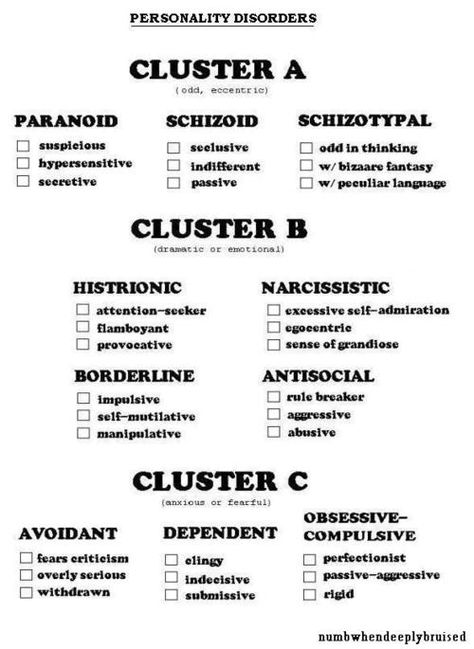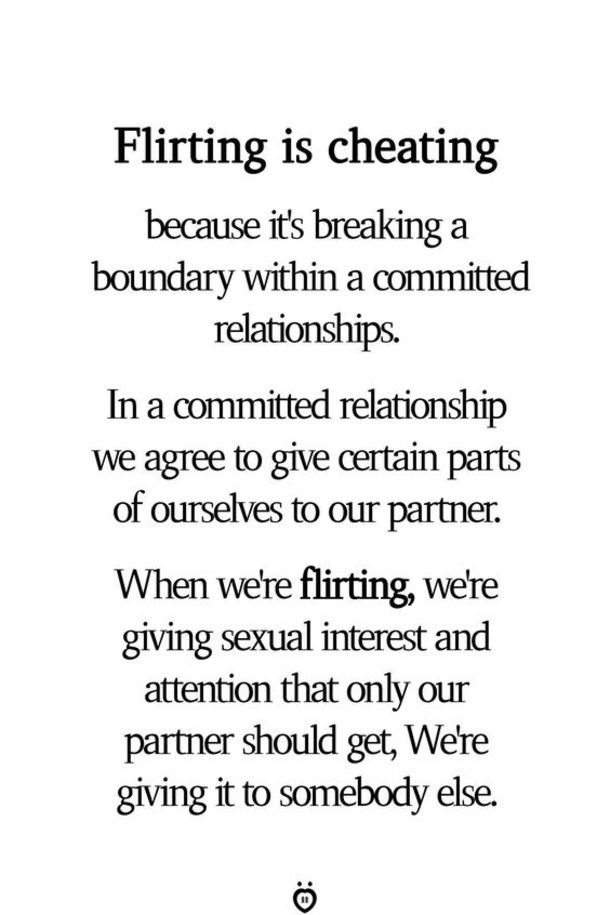Father son relationship issues
The Psychology Behind Strained Father Son Relationships
The Psychology Behind Strained Father Son Relationships
Parenting By Deryl Goldenberg, Ph.D.
Over the years of working with men in therapy, I discovered that the issues that so often come up about careers or relationships could often be traced back, sooner or later, to the lack of relationship with their fathers.
A man in therapy who I’ll call “John” describes his experiences with his father as follows,
My father was a successful clothing salesman who worked a lot, but even when he was home on weekends he wasn’t available. All of my life I’ve suffered from uncertainties about my masculinity. I think it’s because he never shared anything about himself with me. He didn’t tell me what kinds of problems he wrestled with, what he felt, or what it meant to him to be a man. I’ve had to make it all up for myself, and I’m never sure I got it right.”
The German novelist Franz Kafka reveals about this about his father in “Letter to My Father. ”
“What was always incomprehensible to me was your total lack of feeling for the suffering and shame you could inflict on me with your words and judgments.”
Kafka goes on to say that the hostility his father expressed against him as a child, he now turns against himself. “My father’s method of upbringing had saddled me with a general load of fear, weakness and self-contempt.” As an adult, Kafka was haunted by his father’s hostile and impatient presence in his mind.
The American writer and poet, Robert Bly, gave voice to similar sentiments in his poem, “My Father’s Wedding 1924”, “…his skin was bark-like then, made rough to repel the sympathy he longer for, refused, and didn’t need.”
These descriptions are representative of how men recall their fathers relating to them. But even more striking than the obvious damage and wounds, is the repressed longing. Many men are love-starved for their fathers (and fathers for their sons) and deny it. To let this “out of the bag” is to face a great deal of anger, rejection, and sadness.
What is possible between a father and son? What can men do with the array of untapped emotions that shield them from knowing themselves? As adult men we can’t pretend away old unresolved wounds because the hurts eventually resurface in other areas of our lives. The unexpressed hurt and anger often transfer onto our love relationships, parenting, challenges at work, and problems with authority.
If we decide to tackle this wounded relationship in therapy, we will invariably encounter an array of painful childhood memories. We will experience waves of disappointment, rage, and grief at the loss of what we never had with our fathers. By bravely revealing and working through this boiling cauldron of emotion we may come to a meaningful resolution.
Most men will have a strong pull toward salvaging something of a relationship with “the old man.” We may still have a desire to address the damage, and try to have a more personal relationship with our fathers. Perhaps a facilitated conversation in therapy would provide an opportunity to deal with the unfinished business, leftover resentment from our childhood.
In such a conversation, could a father accept his “son’s version” of the past? In cases of neglect, physical or emotional abuse, could a father acknowledge his wrong doing without excusing his behavior? Could he own up, or at the least be open and curious about his son’s experience of him as a parent (which isn’t easy if the father has been abused or neglected himself)? If a father can truly accept his son’s perception of things, together father and son can begin to loosen the ‘Gordian knot’ and move forward.
In thinking of men I’ve worked with, I also wondered how they might feel if their attempt at having an honest father-son exchange was a complete failure. How would they react if their father denied the reality of past events, if they were met by a cold wall of “You got it wrong, and here’s why”? At that point there would seem to be no hope for repair. They could either deny their feelings about their father’s past behavior, or maintain a superficial connection to him, or they could address their own feelings and work towards a resolution.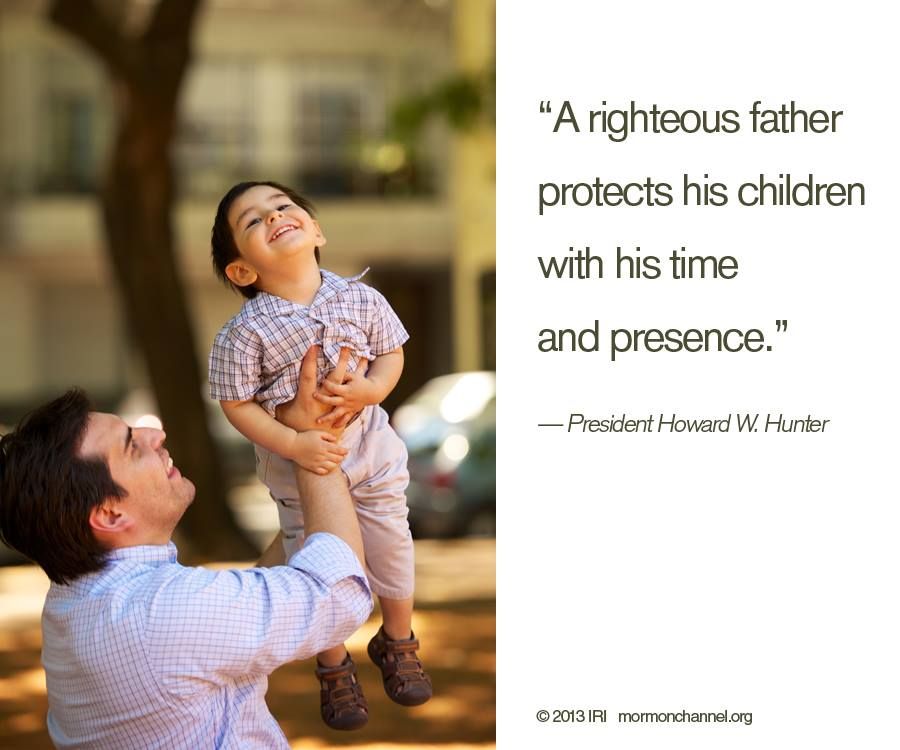 Their attempts for reconciliation may or may not reach their father, but the real psychological work entails making a concerted effort to sort out this jumbled knot of confused, disturbing experiences and memories within themselves.
Their attempts for reconciliation may or may not reach their father, but the real psychological work entails making a concerted effort to sort out this jumbled knot of confused, disturbing experiences and memories within themselves.
Personally, I have twice attempted to untie this knot , first with my father and much later with my own son. At the time of my wife’s pregnancy, for no apparent reason, there was a sudden resurfacing of memories from my childhood. These were largely unpleasant memories of abuse at the hands of my father, which he called discipline. I wanted to try to deal with this upsurge of memories and intense resentment that was coming from deep within me.
After trying to talk to my father and getting nowhere, I asked him if he’d be interested in therapy to address this leftover anger I felt towards him. He responded with, “go pick on someone else in the family.” He thought I was exaggerating the events of the past, and was extremely uncomfortable with my account of what had happened. This created a stalemate between us, and every time I saw him I was tense and would entertain vengeful fantasies. It was as though there was a neon sign that would flash on his forehead, “guilty of abuse”. But I was determined to sort out these feelings, even if it wasn’t going to directly involve him.
This created a stalemate between us, and every time I saw him I was tense and would entertain vengeful fantasies. It was as though there was a neon sign that would flash on his forehead, “guilty of abuse”. But I was determined to sort out these feelings, even if it wasn’t going to directly involve him.
As part of my own therapy, I was able to vent intense feelings of righteous anger, victimization, and outrage. This ongoing venting of rage and hurt eventually opened up a totally unexpected memory. I came to realize that there had been a time when I was really young where I actually had wanted something from my father. It was a shock to have this memory. I was pleased to know that once there had been a time where I had actually wanted my father’s attention and love. I also came to realize that this did not change anything with him, but it meant a lot to me to uncover this wanting feeling for him. Unfortunately, nothing in the realm of relationship was possible with my father. So I had to let go and feel the pain of that old rejection and my anger, and then I was able to disengage and move on.
So I had to let go and feel the pain of that old rejection and my anger, and then I was able to disengage and move on.
When I had a son of my own, I was tested as a father myself. The first early years with my son started off really well, but as he developed and became more autonomous and defiant, sadly, I was unable to manage my reactivity to his testing of boundaries, etc. as all children do. I couldn’t turn this around, and lost my handle on his development. When he was around 5 or 6 years old, things started to “go south” between us. No matter how much I had promised myself that I wouldn’t repeat and recreate the hostile relationship I’d had with my own father, I felt almost compelled, unconsciously, to reenact my own childhood with my son. Here it was happening to me, not as extreme, but still a strained relationship, and this broke my heart that I was still so psychologically immature.
I ended up on quite a roller coaster of a ride as a father. My son is now a grown man and we are currently sorting out our relationship. Now I am the father open to dealing with the issues with my own son. I am willing to acknowledge my shortcomings and listen to his childhood experiences, as painful as they are to hear. We are slowly making our way through our troubled history moving towards something of a relationship.
Now I am the father open to dealing with the issues with my own son. I am willing to acknowledge my shortcomings and listen to his childhood experiences, as painful as they are to hear. We are slowly making our way through our troubled history moving towards something of a relationship.
As men face the truth about their father-son bond, they will experience both pain and liberation. As they make their way through this emotional labyrinth, it can become a true “rite of passage.” The son can emerge with a stronger sense of his identity and a solid sense of his own masculinity. The son can come to feel more integrated as a man and perhaps willing to see his father more realistically, with both positive and negative traits. Both father and son may be able to recognize more clearly how their negative unexpressed feelings may still be impacting their intimate relationships as well as intruding into their friendships with men.
The optimal outcome, as men move forward toward resolving their feelings with their fathers, is to no longer be entangled with them through anger or hurt.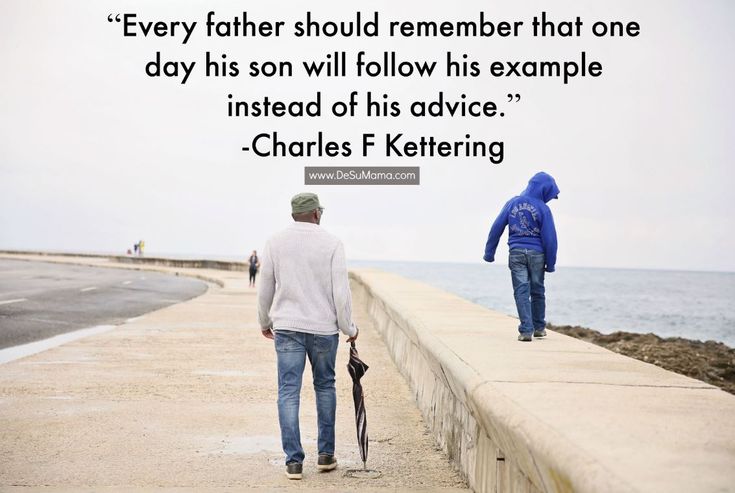 Men can bring their newly earned individuation and energy into their love life, work life and friendships with other men.
Men can bring their newly earned individuation and energy into their love life, work life and friendships with other men.
Deryl Goldenberg, PhD is a clinical psychologist in private practice in Santa Monica and Santa Barbara and has focused his work on Male Psychology and Couples Relationship issues for over 30 years. To learn more about Dr. Goldenberg, visit his website or email him here.
About the Author
Related Articles
Tags: child abuse, child happiness, father, parent child communication, parenting
5 Things Dads Do that Push Their Sons Away
Bart’s dad was an angry person. As a child, Bart had to endure three to four beatings a week. Sometimes a beating would even be given over something frivolous like the Dallas Cowboys losing. Eventually, the beatings stopped and were replaced with apathy, which to Bart was even more painful than the physical pain he bore in his earlier years.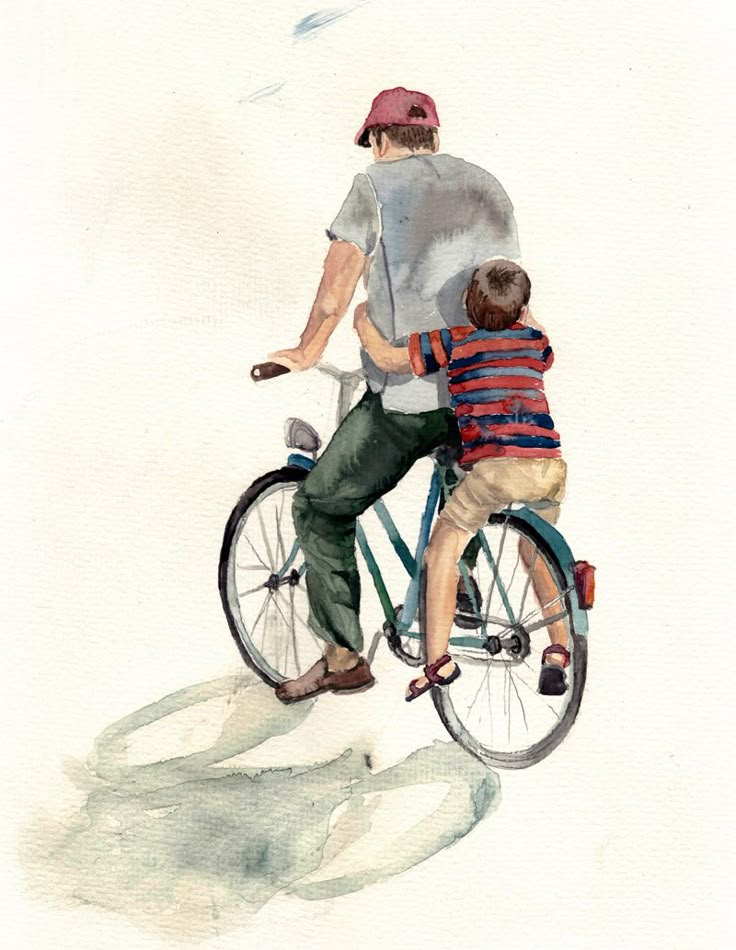 Gradually, the two stopped talking altogether. Things didn’t change until his father got cancer. His father had a faith conversion and began to change. As his physical health deteriorated, his faith and love grew stronger. He began to pursue Bart and love him in the way Bart always desired.
Gradually, the two stopped talking altogether. Things didn’t change until his father got cancer. His father had a faith conversion and began to change. As his physical health deteriorated, his faith and love grew stronger. He began to pursue Bart and love him in the way Bart always desired.
It took a long time for Bart’s dad to win back his son after all he had done. After his dad passed away, Bart went on to write the song “I Can Only Imagine”, which became a number one hit around the world. The story behind the song is all about Bart and his relationship with his father. It is beautifully told in the movie I Can Only Imagine, which is available to buy now. Although most dads don’t subject their sons to abuse, there are common things we do that push our sons away. If we want great relationships with our sons, we want to avoid these things that hurt the father and son relationship. Here are 5 things dads do that push their sons away.
1. Expect the Son to be Better
We all want our sons to do better in life than we did. Sometimes I think we forget that we had to learn some life lessons through pain and trial. We can start to expect our sons to know the lessons already when it took us years to learn them. Those expectations are unfair and put pressure on him that will cause him to retreat. As my mom has said, “They just got here.” Our sons haven’t been on earth long and because they have our DNA they are prone to the same mistakes and growing pains as us. Be patient with him.
Sometimes I think we forget that we had to learn some life lessons through pain and trial. We can start to expect our sons to know the lessons already when it took us years to learn them. Those expectations are unfair and put pressure on him that will cause him to retreat. As my mom has said, “They just got here.” Our sons haven’t been on earth long and because they have our DNA they are prone to the same mistakes and growing pains as us. Be patient with him.
Result: The son feels pressure.
2. Being Overly Critical
Since we want our sons to do better than we did and avoid our mistakes, it can lead to us also being overly critical. We look for opportunities where we can ‘coach’ our sons up and offer advice. However, many times it just ends up making our sons feel like they aren’t good enough. Even compliments can be accompanied by a criticism,
“You made a great play out there at second. Next time throw to first and complete the double play. ” We want to be able to teach our sons valuable lessons like this, but it’s important to evaluate how many of your compliments also include an ‘opportunity for growth’.
” We want to be able to teach our sons valuable lessons like this, but it’s important to evaluate how many of your compliments also include an ‘opportunity for growth’.
Result: The son never feels like he’s good enough.
3. Living through the Son’s Achievements
I’ll be the first to admit. I love watching my son win games. It’s an exciting and fun feeling. That feeling can get addicting and the desire to experience more can become emotional. All of a sudden you can get mad when it doesn’t happen. If our emotions are regulated by our son’s achievements or that of his teams then we need to pull the reigns back. It’s fine to enjoy the wins or to feel bummed with them during losses, but we need to remember it’s about them not us. As dads, we need to be a source of encouragement, not one of pressure.
Result: The son feels like the dad’s love is based on his performance.
4. Being Apathetic
Many dads get wrapped up in the stress of jobs or their own ambition rather than investing time and energy in their sons.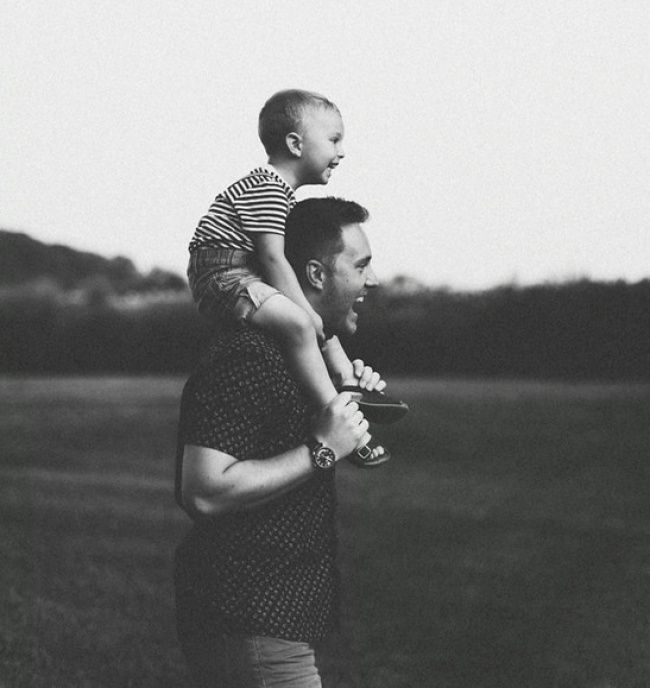 It’s the little choices that end up adding up to a big deal. It’s coming home and turning on the TV instead of catching up on his day or playing with him. Or it’s staying at work one day after another and missing the opportunity to be with him.
It’s the little choices that end up adding up to a big deal. It’s coming home and turning on the TV instead of catching up on his day or playing with him. Or it’s staying at work one day after another and missing the opportunity to be with him.
Result: The son feels like he doesn’t matter to the dad.
5. Unresolved Pain and Anger
As dads, we need to be a source of encouragement, not one of pressure.Whatever is true of us below the surface will eventually work its way out. Unresolved wounds have a way of coming out in distorted thinking, insecurity, fits of anger, and in many cases, abuse. The dad creates an environment of fear and instability. The dad is viewed as someone who is unsafe.
Result: The son lives anxious and afraid of the dad or the instability he causes.
Father and son. Attributes of male education
Father as a guide to the world of social relations
In manifestations of parental love, fathers differ from mothers. In most cases, the mother loves her child unconsciously, her love seems to be programmed genetically. The love of a father is always objective. The father traditionally associates his love with the success and achievements of the child. Thus, literally from the first years of life, the father demonstrates and instills in the child a value attitude towards himself, the world, and the life situation. This is especially evident in the process of raising a boy. Introducing his son to the value system, the father introduces him to the world of social relations, where a person's assessment of himself, his successes and achievements is largely shaped by the assessments of others. In fact, based on an evaluative approach to the son, his opinions, decisions, actions, the father consciously or unconsciously teaches the boy to see himself and his actions from the outside, correlating them with a certain system of social assessments, with the criteria for the acceptability of certain actions in specific situation.
In most cases, the mother loves her child unconsciously, her love seems to be programmed genetically. The love of a father is always objective. The father traditionally associates his love with the success and achievements of the child. Thus, literally from the first years of life, the father demonstrates and instills in the child a value attitude towards himself, the world, and the life situation. This is especially evident in the process of raising a boy. Introducing his son to the value system, the father introduces him to the world of social relations, where a person's assessment of himself, his successes and achievements is largely shaped by the assessments of others. In fact, based on an evaluative approach to the son, his opinions, decisions, actions, the father consciously or unconsciously teaches the boy to see himself and his actions from the outside, correlating them with a certain system of social assessments, with the criteria for the acceptability of certain actions in specific situation. It is no coincidence that in everyday consciousness there is a system of double standards in relation to the behavior of boys and girls. Often, not only from his father, but also from his mother, the boy hears: “Be a man!”, “Well, why are you crying like a girl!”, “Be patient, you’re a man!”, “Look at dad!” etc. Thus, almost from the first days of life, the child begins to learn a set of certain social standards that a boy must meet.
It is no coincidence that in everyday consciousness there is a system of double standards in relation to the behavior of boys and girls. Often, not only from his father, but also from his mother, the boy hears: “Be a man!”, “Well, why are you crying like a girl!”, “Be patient, you’re a man!”, “Look at dad!” etc. Thus, almost from the first days of life, the child begins to learn a set of certain social standards that a boy must meet.
The mention of the father in this context is not accidental, because it is the father who introduces the son into the world of social relations. By his behavior, his attitude to the world and to the people around him, the father provides his son with an initial model and for a long time, perhaps throughout his son's life, is a direct example for him to follow. The relationship between a son and his father, no matter what spheres they touch and in whatever form they manifest, is always socially oriented. Even more clearly this desire to adapt the boy to the wide world is manifested in direct communication between father and son. Conversations between father and son, joint games and hobbies - all this has a clear social connotation. In all forms of communication, the father, on the basis of his experience, teaches his son to act effectively in certain life situations, and to act in the way that befits a man, in accordance with accepted norms of behavior. This life-learning process is diverse and multifaceted. It includes the development of self-control skills, the ability to interact with people, applied skills related to the implementation of practical actions (using tools and various housework, repairing technical devices, etc.), specific "male" hobbies (hunting, fishing, attending sports competitions).
Conversations between father and son, joint games and hobbies - all this has a clear social connotation. In all forms of communication, the father, on the basis of his experience, teaches his son to act effectively in certain life situations, and to act in the way that befits a man, in accordance with accepted norms of behavior. This life-learning process is diverse and multifaceted. It includes the development of self-control skills, the ability to interact with people, applied skills related to the implementation of practical actions (using tools and various housework, repairing technical devices, etc.), specific "male" hobbies (hunting, fishing, attending sports competitions).
Such educational influences form the boy as a representative of the male subculture, give him knowledge about the distribution of roles and responsibilities between the sexes, create an orientation of his interests and ways to implement them, corresponding to generally accepted ideas about what a boy should be fond of and do. That is why most fathers have an extremely negative attitude towards the manifestations of inappropriate, from their point of view, games, hobbies and interests in their son: playing with dolls, using female images in role-playing games, closely following fashion, increased interest in their own appearance, etc. . Also, the son's lack of interest in technology, craft, etc. can become a subject of irritation for fathers. Such negative emotions are quite understandable: in this situation, the father, at some subconscious level, feels that he cannot cope with the function that he must perform - to prepare his son for life in a society where the parameters of a man's perception are predetermined.
That is why most fathers have an extremely negative attitude towards the manifestations of inappropriate, from their point of view, games, hobbies and interests in their son: playing with dolls, using female images in role-playing games, closely following fashion, increased interest in their own appearance, etc. . Also, the son's lack of interest in technology, craft, etc. can become a subject of irritation for fathers. Such negative emotions are quite understandable: in this situation, the father, at some subconscious level, feels that he cannot cope with the function that he must perform - to prepare his son for life in a society where the parameters of a man's perception are predetermined.
That is why, from the earliest years of the child, the father must participate in the process of his upbringing. In everyday consciousness, there is an opinion that in early childhood the child belongs entirely to the mother, and the father begins to raise the already grown up baby. Such an approach is dangerous because the boy's spheres of interest, his manners of behavior will be unnecessarily subject to maternal influence. In the absence of a balancing educational influence of the father, this can lead to socially undesirable deformations of the interests, hobbies and behavior of the child. Only under the direct guidance of his father, seeing in front of him a clear example of a masculine approach to solving life problems, the boy will be able to form and realize himself as a man - in accordance with the expectations of society.
In the absence of a balancing educational influence of the father, this can lead to socially undesirable deformations of the interests, hobbies and behavior of the child. Only under the direct guidance of his father, seeing in front of him a clear example of a masculine approach to solving life problems, the boy will be able to form and realize himself as a man - in accordance with the expectations of society.
The inculcation of purely masculine forms of behavior occurs not only through teaching a child some skills or demonstrating a pattern of behavior to him, but also through direct transmission of a system of life values and views on life from father to son. A special role here is played by conversations between father and son on a wide range of problems - both universal, “philosophical”, and affecting the sphere of male interests proper (decision-making and actions in difficult life situations, leisure organization, attitude towards the opposite sex, sexual life, etc.). d.).
d.).
On his own, it is very difficult for a boy, a growing man, to make a decision about which model of an act reflects actually masculine traits. In this case, the father sets the most effective example, in comparison with which or on him, guided by the son, he will determine his own behavior. In transmitting to the son the forms and methods of realizing male behavior, the father is obliged to assume the functions of an intermediate link that would meet the requirements of society, on the one hand, and would correspond to the father’s personal ideas about the ideal of male behavior, on the other. This complex influence forms the boy as a representative of the male community.
Thus, this difficult, responsible, but honorable duty is placed on the shoulders of the father - to introduce his son into the world of social relations, to teach him to respond like a man to the challenges that life throws, to help him manifest and realize himself as a man. This is one of the main functions of the father in the upbringing of the boy - but not the only one.
The father as a model of relations with the opposite sex and sexuality
Another extremely important function of the father is the organization of the boy's sexual education. A father for a son is the primary source, if not direct, then indirect information about the relationship between the sexes. It is in the family, observing the relationship between father and mother, that the boy acquires his first experience of relating to the opposite sex. The father here acts as a model of male behavior, which at first will be unconsciously copied by the son in almost all situations related to communication with the opposite sex.
At the age of 3 to 5, every little man experiences the so-called Oedipus complex - the desire to concentrate the mother's love and attention on himself, while the father is seen as a rival in the struggle for this love, which awakens in the child negative emotions towards to him. This situation can be viewed as one of the stages of the child's psychosexual development, at which, with the help of behavioral means available to him, he first declares his gender and actively demonstrates it.
From the point of view of psychology, there is nothing unnatural in this, but for many fathers, such behavior of their son becomes an unexpected and unpleasant surprise. And this is quite understandable, because opposition to the father can take a variety of forms - from the desire to constantly be with the mother and limit her communication with the father to open manifestations of verbal and non-verbal aggression. Such behavior of a son seems to most fathers unreasonable and inexplicable: an affectionate and obedient son suddenly becomes uncontrollable and aggressive. However, it is not worth overdramatizing the events - all this is temporary. Usually, by the age of 5-6, the Oedipus complex is resolved through the formation of stable traits of gender-role behavior inherent in a man, and the adoption of the father as the main object for imitation.
However, it should be noted that the effective resolution of the Oedipus complex, as well as the normal development of sexual identification in general, is possible only if the father actively participates in the boy's life. The absence of a father as an example of male gender role behavior can have far-reaching consequences for a boy, ranging from relationship problems with members of the opposite sex to sexual disorientation and sexual problems.
The absence of a father as an example of male gender role behavior can have far-reaching consequences for a boy, ranging from relationship problems with members of the opposite sex to sexual disorientation and sexual problems.
Is a father really that important?
Film "Dedicated to Superdads"
Summing up, we can conclude that the roles and functions of the father in the upbringing of the boy come down to two main duties that are extremely important for his (the boy's) future life.
- The father introduces the child into the world of social relations, teaches him to adequately perceive and evaluate himself and others, contributes to the formation of the son as a representative of the male subculture. All this determines the personal and social development of the boy.
- A father helps his son to realize himself as a man, which predetermines the boy's normal mental development and prevents problems in the field of gender relations.

A man's non-participation in the performance of these important functions can serve as a source of a wide variety of problems in a boy's life:
- he can become an outcast among his peers, acquiring the label of "mama's boy" only because he did not have before his eyes an example of male behavior, a male way of solving life's problems;
- a boy can become the subject of ridicule due to ignorance of any realities of the male subculture;
- his communication with representatives of the opposite sex can also be aggravated by a large number of problems due to the inability to make contacts and build a system of relationships.
The roots of all these difficulties usually lie in the fact that at the appropriate moments in the development of the son, the father did not pay the necessary attention to his upbringing, considered unnecessary a simple sincere conversation with his son, or, which most often happens, there was simply not enough time for this. In the modern world, fathers of families often see it as their duty to ensure the material well-being of the family - and this cannot be considered wrong in any way. The problem is that the role of the father in the family, especially in the upbringing of the boy, is not limited to this alone. The lack of material resources is perceived very painfully, but the absence of a father's upbringing can have simply catastrophic consequences for the boy's future life. That is why, with all the difficulties and hardships, a loving father must remember that the happiness of his son depends not so much on the material resources that the father invested in his child, but on how effectively he, the father, coped with his educational functions.
In the modern world, fathers of families often see it as their duty to ensure the material well-being of the family - and this cannot be considered wrong in any way. The problem is that the role of the father in the family, especially in the upbringing of the boy, is not limited to this alone. The lack of material resources is perceived very painfully, but the absence of a father's upbringing can have simply catastrophic consequences for the boy's future life. That is why, with all the difficulties and hardships, a loving father must remember that the happiness of his son depends not so much on the material resources that the father invested in his child, but on how effectively he, the father, coped with his educational functions.
About trust and mutual understanding between father and son
Trust is built from an early age. For the relationship of father and son, trust is the cornerstone on which the entire system of raising a man is built and on which the successful result of this process depends.
Trust and mutual understanding in the relationship between father and son are laid from an early age. If the father from the first days of the child's life takes an active part in caring for him, playing with him and talking, this creates an important psychological bond between them. The father, perhaps without noticing it himself, begins to better understand his child, his desires and needs. All this creates a solid basis for the development of mutual understanding between father and son in the future. Mutual understanding, in turn, is a prerequisite for the formation of trusting relationships. The initiator, the source of trust here is the father. It is his actions that prevent the emergence of a barrier of misunderstanding and coldness.
From a very early age, the boy needs to be sure that his father is a person who can understand and help him, and this ability to understand is not similar to that shown by the mother, it is based not on the desire to regret, but on men's assessment of the problem and ways to solve it. And the father can achieve such confidence of the son in him only through the demonstration of his attitude. Sincere interest in the affairs and experiences of the son, in his opinions and hobbies, conversations on a wide variety of topics - these are the simple tricks that create special warmth and mutual understanding in the relationship between father and son. And the fruit of these efforts will be the son's trust in his father - like the blooming of a flower bud in response to caring for him.
And the father can achieve such confidence of the son in him only through the demonstration of his attitude. Sincere interest in the affairs and experiences of the son, in his opinions and hobbies, conversations on a wide variety of topics - these are the simple tricks that create special warmth and mutual understanding in the relationship between father and son. And the fruit of these efforts will be the son's trust in his father - like the blooming of a flower bud in response to caring for him.
Initially, in childhood, this trust is simple and unsophisticated and is expressed primarily in the fact that the child has an urgent need to tell his father about the events that happened in his life, for example, today. These events in the eyes of an adult can be quite ordinary. But no matter how ordinary, not worthy of attention they may seem, in no case should they be ignored, demonstrating indifference. Having brushed aside, not listening to his son one, another time at the moment when the son longs for communication, wants to be heard, the father will simply kill this need in the child - and the next time the boy will not come to his father to share his story with him. Perhaps he will find another listener or withdraw into himself, but, be that as it may, the first, albeit subtle, crack will appear in the relationship between father and son, which in the future may lead to a complete lack of understanding.
Perhaps he will find another listener or withdraw into himself, but, be that as it may, the first, albeit subtle, crack will appear in the relationship between father and son, which in the future may lead to a complete lack of understanding.
Sometimes another situation can be observed - the baby does not show a clear need to share with anyone his experiences, stories about events in his life, etc. Perhaps this is due to the psychological characteristics of the child - if the boy has a phlegmatic temperament, then he will not strongly strive to be noticed, listened to, etc. But another explanation is possible: for some reason, the child has the wrong impression about the insignificance of the events that happen to him, about the absence of the need to talk about them to other people, and then the boy will also not be inclined to talk. In these cases, it is worth not leaving the child to himself, but carefully, unobtrusively creating an atmosphere that would contribute to his self-disclosure.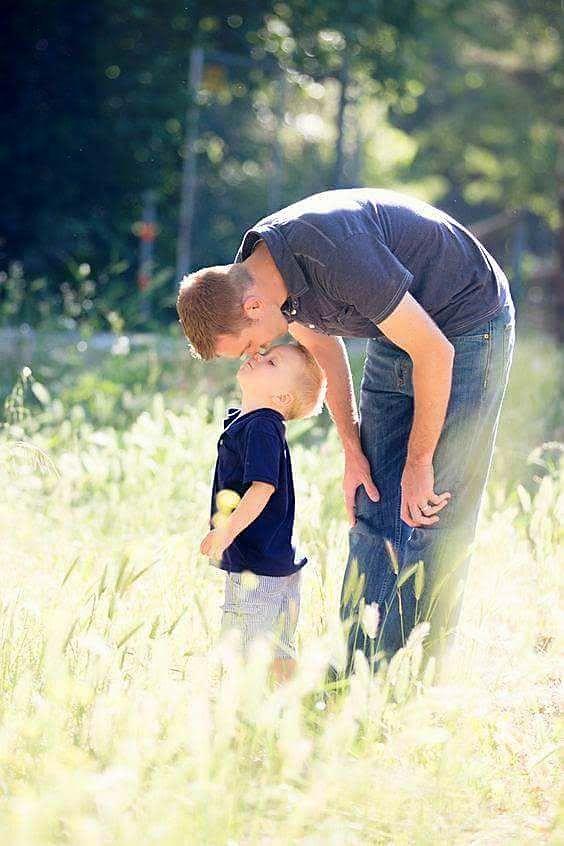 You can start a conversation with a child not with a direct question, but with a story about some case or event, perhaps even unrelated to what you would like to talk about. Such a technique will pave the way for the continuation of communication, during which it will be possible to discuss the issue of interest to the parent.
You can start a conversation with a child not with a direct question, but with a story about some case or event, perhaps even unrelated to what you would like to talk about. Such a technique will pave the way for the continuation of communication, during which it will be possible to discuss the issue of interest to the parent.
The son has matured. How to maintain trust?
Regardless of who is the initiator of communication - the son or the father, it is necessary in order not to interrupt the connecting thread that arises between father and son from early childhood. And if trust at this age is not yet colored by the specifics of male or female communication, but simply serves as a sign of a sincere and positive relationship between a son and a father, then in the future trust will play a decisive role in the transmission and perception of information about the characteristics of the male subculture.
Such trust and mutual understanding become important during adolescence. Adolescent communication is specific, which is manifested in the topics discussed, the degree of openness of communication, etc. Usually, teenage boys are very secretive and are not inclined to share their experiences with anyone at all, and even more so they are not ready to talk with their parents about those questions that really interest them - about friendship, love, sexual relations. It is not often that there are families in which there is complete trust between parents and a teenage son. Even less often, a father is chosen as an object of trust, a person to whom one can tell the most intimate.
Adolescent communication is specific, which is manifested in the topics discussed, the degree of openness of communication, etc. Usually, teenage boys are very secretive and are not inclined to share their experiences with anyone at all, and even more so they are not ready to talk with their parents about those questions that really interest them - about friendship, love, sexual relations. It is not often that there are families in which there is complete trust between parents and a teenage son. Even less often, a father is chosen as an object of trust, a person to whom one can tell the most intimate.
According to our studies of the formation of trusting relationships in adolescence, topics such as personal secrets, friendship and love, committed misconduct, at the age of 11-12 years are discussed mainly with the mother, or with no one at all, and already from the age of 13 friends and girlfriends become the main objects of trust, while parents fade into the background. Thus, in the process of growing up a child, trust and mutual understanding with parents, if not completely lost, is significantly reduced. This happens partly for reasons related to the psychological characteristics of a teenager - the desire to be or appear independent in adolescence often takes hypertrophied forms, and therefore a teenager tends to reject any, even reasonable, advice from parents and not perceive them not only as authorities, but also generally as people who can be trusted. But to some extent, the parents themselves are to blame for the loss of trust, being indifferent to the problems of a teenager, ignoring his opinion, etc.
This happens partly for reasons related to the psychological characteristics of a teenager - the desire to be or appear independent in adolescence often takes hypertrophied forms, and therefore a teenager tends to reject any, even reasonable, advice from parents and not perceive them not only as authorities, but also generally as people who can be trusted. But to some extent, the parents themselves are to blame for the loss of trust, being indifferent to the problems of a teenager, ignoring his opinion, etc.
However, maintaining a good, understanding, trusting relationship between parents and a teenage child is by no means an unattainable ideal. Perhaps some cooling will still occur due to the already mentioned changes in the adolescent's self-perception. But firstly, this is not a generally binding rule, and secondly, it is in the power of parents to prevent the deepening of misunderstanding and distrust. The recipe here is simple - you need to treat the teenager with respect, not in words, but in deeds, listen to and take into account his opinion, do not try to solve his problems for him and against his will. Mutual trust between father and son is important for several reasons. Firstly, only under this condition can they discuss very personal, purely masculine topics, for example, changes that occur in the body of a teenager during puberty. Not trusting his father, the boy is unlikely to turn to him with such questions. The father's distrust of his son may manifest itself in the fact that he will not be ready to speak frankly with his son on these topics, even if he turns to him for clarification. Secondly, trust is necessary so that the son does not perceive with skepticism what the father tells him. By trusting the father's advice based on life experience, the son will be able to avoid many mistakes and disappointments in his own life. However, here, too, reciprocal trust on the part of the father is essential - only by truly trusting the son, the father can allow him to independently determine his fate. Such a step requires the father and the determination to give the son this right, including the right to make a mistake.
Mutual trust between father and son is important for several reasons. Firstly, only under this condition can they discuss very personal, purely masculine topics, for example, changes that occur in the body of a teenager during puberty. Not trusting his father, the boy is unlikely to turn to him with such questions. The father's distrust of his son may manifest itself in the fact that he will not be ready to speak frankly with his son on these topics, even if he turns to him for clarification. Secondly, trust is necessary so that the son does not perceive with skepticism what the father tells him. By trusting the father's advice based on life experience, the son will be able to avoid many mistakes and disappointments in his own life. However, here, too, reciprocal trust on the part of the father is essential - only by truly trusting the son, the father can allow him to independently determine his fate. Such a step requires the father and the determination to give the son this right, including the right to make a mistake. Taking this step is not easy, because this is not a formal removal from the problems of the son, but a sincere recognition that the son has already become an adult (this is not easy for parents) and no longer needs guardianship and control from his father.
Taking this step is not easy, because this is not a formal removal from the problems of the son, but a sincere recognition that the son has already become an adult (this is not easy for parents) and no longer needs guardianship and control from his father.
Thus, it is through the manifestation of parental trust that the boy enters the world of adults, enters into his independent life. It starts with little things - the father allows his son to do something on his own, without controlling him, "without standing over his soul." This small step opens the way to the future, the completion of which for the son will be his ability to independently make decisions, set goals and plan ways to achieve them, i.e. the acquisition of the whole complex of qualities necessary for a man. And without the trust of the father, the development of independence in a boy is impossible. Male infantilism is nothing more than a habit of lack of independence, of shifting responsibility to others, generated by a lack of trust on the part of parents. That is why the expression of trust is important not only for the son - by this he shows filial respect for his father, but also for the father - after all, his trust in his son is one of the key means of forming truly masculine qualities.
That is why the expression of trust is important not only for the son - by this he shows filial respect for his father, but also for the father - after all, his trust in his son is one of the key means of forming truly masculine qualities.
Men's joys: joint games and hobbies
Games with a child begin from the very first months of his life. At first, these are various finger games - “Forty-white-sided”, “Ladushki”; rattle games, etc. In such games, the father usually does not take part, leaving these fun and entertainment to the mother. But this position is absolutely wrong. In these simple, but extremely necessary games for the development of the child, there is a complex work to establish contacts between the child and the outside world. And the absence of the father in these games leads to the fact that the child begins to perceive him as something distant, incomprehensible, alien. By playing and communicating, father and son begin to build their relationship. The child gets used to the timbre of his father's voice, to his appearance, actions. The father, for his part, learns to understand his child and his needs, expressed through facial expressions, babble, etc. Thus, the basis of future mutual understanding between father and child is created in the game. We are not yet talking about a son or daughter, because in the first months of a child's life, there is no need to differentiate games and communication with him by gender. Even toys bought by parents for a child of the first year of life do not have any strict division by gender - they are universal: rattles, balls, soft toys, etc. are equally used in games by both boys and girls.
The father, for his part, learns to understand his child and his needs, expressed through facial expressions, babble, etc. Thus, the basis of future mutual understanding between father and child is created in the game. We are not yet talking about a son or daughter, because in the first months of a child's life, there is no need to differentiate games and communication with him by gender. Even toys bought by parents for a child of the first year of life do not have any strict division by gender - they are universal: rattles, balls, soft toys, etc. are equally used in games by both boys and girls.
How to play with a boy?
But in the second year of a child's life, the situation changes dramatically. The choice of toys is already clearly determined by the sex of the child. And although a certain universalism of toys is still present - soft toys, pyramids, cubes are still purchased for both boys and girls, but otherwise the toys bought by a son or daughter are beginning to differ more and more. For a boy, such a milestone acquisition is most often a toy car, and for a girl - a doll. This is how separate games for girls and boys appear from about the age of one. And it is natural that here, in boyish games, the father takes a more active part.
For a boy, such a milestone acquisition is most often a toy car, and for a girl - a doll. This is how separate games for girls and boys appear from about the age of one. And it is natural that here, in boyish games, the father takes a more active part.
What are these games?
They necessarily have a focus on the development of certain properties and qualities inherent in men and most in demand in life situations that men face. Therefore, joint games of father and son have a number of fairly clearly identified features. First of all, they necessarily have an active motor component. The joint games of father and son are most often noisy fuss and running around. Hide-and-seek, hide-and-seek, catch-up - these are typical examples of such games. They stimulate the physical development necessary in the formation of a man. Often in such games there are elements of power confrontation: various types of struggle, practicing methods of physical impact and counteraction, etc. .
.
However, the initiative in organizing games of this kind comes not only from the father. The son can also start such entertainment. It must be said that the popularity of such games gradually increases, starting at about 4-5 years of age, and reaches its apogee by 7-8 years. This is not accidental - it is during this age interval that the process of the boy's sexual self-identification, active self-affirmation as a representative of the male half of humanity, falls. This explains the need for power confrontations with the father, which make a significant contribution to such self-affirmation. The skills and abilities acquired in games with the father are subsequently transferred to a new environment, and the process of self-affirmation begins anew among peers.
Another sign of men's games is their clearly expressed competitive orientation. Already from the first years of the boy's life in his games with his father there is an element of comparison: who is stronger, faster, more accurate, etc. That is why in almost any game there are certain signs by which victory is determined. Achieving victory is the simplest and most effective way to find out which of the participants in the game turned out to be the strongest, most dexterous, skillful, etc. The competitiveness of father and son games is of considerable psychological importance. Firstly, it can be regarded as an unconscious desire of the son to test himself, his qualities in a situation of rivalry with another male representative, which is the father. Secondly, this is the desire to feel like a winner, a person capable of significant efforts to achieve the goal. Thirdly, this is again the stimulation of the physical and mental development of the boy, the catalyst for which is precisely the competition, comparing oneself with others. All this together allows the boy to prepare for an independent life within the male subculture, because rivalry is one of the main characteristics of male communication.
That is why in almost any game there are certain signs by which victory is determined. Achieving victory is the simplest and most effective way to find out which of the participants in the game turned out to be the strongest, most dexterous, skillful, etc. The competitiveness of father and son games is of considerable psychological importance. Firstly, it can be regarded as an unconscious desire of the son to test himself, his qualities in a situation of rivalry with another male representative, which is the father. Secondly, this is the desire to feel like a winner, a person capable of significant efforts to achieve the goal. Thirdly, this is again the stimulation of the physical and mental development of the boy, the catalyst for which is precisely the competition, comparing oneself with others. All this together allows the boy to prepare for an independent life within the male subculture, because rivalry is one of the main characteristics of male communication.
Naturally, in a rivalry with his father, the boy has rather illusory chances of winning. However, in the game, the father must remember that the feeling of victory is necessary for his son. This in no way means that the father should constantly give in to his son, on the contrary, an easy victory, and even more so the disclosure of a clear concession on the part of the father, can lead to disappointment and resentment. And the older the son, the more offensive these giveaways will be for him. But at the same time, sometimes a father needs to give in to his son. This should not be an obvious, feigned concession - for a complete sense of victory, the concession must occur after a stubborn struggle. And how joyful it will be for the son to realize that he was able to defeat a strong and dexterous opponent! From a psychological point of view, this feeling of victory is very important for the formation of a man, the formation of his self-esteem.
However, in the game, the father must remember that the feeling of victory is necessary for his son. This in no way means that the father should constantly give in to his son, on the contrary, an easy victory, and even more so the disclosure of a clear concession on the part of the father, can lead to disappointment and resentment. And the older the son, the more offensive these giveaways will be for him. But at the same time, sometimes a father needs to give in to his son. This should not be an obvious, feigned concession - for a complete sense of victory, the concession must occur after a stubborn struggle. And how joyful it will be for the son to realize that he was able to defeat a strong and dexterous opponent! From a psychological point of view, this feeling of victory is very important for the formation of a man, the formation of his self-esteem.
Adult games
As the son grows older, his games with his father gradually lose their childishness and approach those games played by adults. In communication between father and son, sports (football, volleyball) and intellectual-logical (card games, dominoes, etc.) games occupy an increasing place. These games, accepted in the male environment, replace those played by the father and his little son. Wrestling (or rather, it is a power confrontation with his father), playing with cars and soldiers lose their attractiveness for a growing son, become symbols of childhood for him, unacceptable for an already “adult” boy, as he considers himself. However, the desire to play does not disappear. And those tasks that were solved in children's games, at the next age stage, starting from 9- 10 years old, implemented with the help of other games traditionally accepted in the male community. In addition to the already mentioned functions of the game related to the development of masculine qualities, these games have another important element - they serve as a tool for introducing the boy into the world of male relationships, into the world of male subculture.
In communication between father and son, sports (football, volleyball) and intellectual-logical (card games, dominoes, etc.) games occupy an increasing place. These games, accepted in the male environment, replace those played by the father and his little son. Wrestling (or rather, it is a power confrontation with his father), playing with cars and soldiers lose their attractiveness for a growing son, become symbols of childhood for him, unacceptable for an already “adult” boy, as he considers himself. However, the desire to play does not disappear. And those tasks that were solved in children's games, at the next age stage, starting from 9- 10 years old, implemented with the help of other games traditionally accepted in the male community. In addition to the already mentioned functions of the game related to the development of masculine qualities, these games have another important element - they serve as a tool for introducing the boy into the world of male relationships, into the world of male subculture.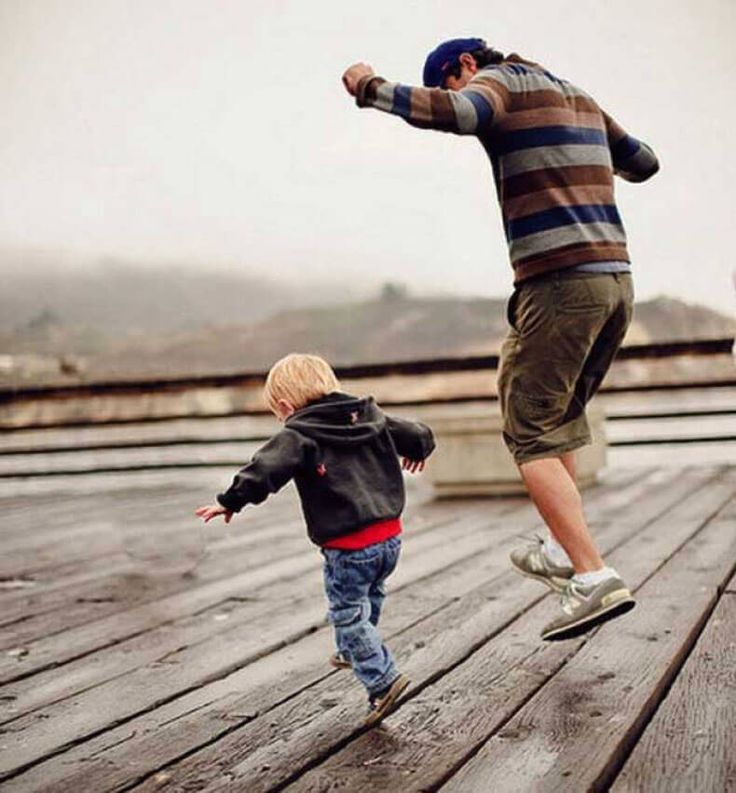
Thus, in preadolescence and adolescence, the games of father and son will already have a clearly oriented social orientation, introducing the boy to male forms of entertainment. And probably, the beginning and middle of adolescence, i.e. 10-12 years old, will be the last age period when joint games are still present in the communication of father and son. After that, the games themselves gradually become an infrequent form of pastime (with the possible exception of computer games), and mainly peers are chosen as partners for games. It can be said that by this age the joint games of father and son had fulfilled their task. The boy already has experience of rivalry and interaction in the game, he knows the rules of behavior in such “male” games, etc. Therefore, “the Moor has done his job, the Moor can leave” - in adolescence, the games of father and son really lose their meaning and meaning as a preparation for the independent life of the boy, because this independent life and communication in the male environment has already begun.
Men's hobbies
Father and son games disappear in adolescence, but this does not mean that father and son's joint pastime and entertainment stop there. There is still a vast sphere of communication between father and son, connected with common affairs and hobbies. The development of this area goes hand in hand with the development of joint games. Their tasks completely coincide - this is preparation for an independent life and familiarization with the male subculture. It is unlikely that a father will teach his son to embroider or initiate a joint trip to clothing stores - these entertainment options do not belong to the traditional sphere of male interests. But learning how to repair equipment, driving cars and motorcycles, or, for example, attending a football competition - these hobbies are considered male.
The world of men's hobbies and entertainment is very diverse, even a simple listing of them takes up a lot of space - this is the repair and design of any technical devices, and active sports, and men's hobbies: hunting, fishing, "cheering" for sports teams, various types of modeling, etc. Introducing the son into the world of these hobbies, the father thereby contributes to his self-determination as a man, determines the formation of his horizons according to the male type. This is how the problem of adapting the son to the male environment is solved. After all, it is these hobbies that are likely to become the subject of discussion among peer boys. Possession of knowledge and skills in the traditionally male fields of activity greatly increases the boy's prestige and his social status among his peers. So, through introducing the son to the values of the male subculture, the father influences his perception by peers and adult men.
Introducing the son into the world of these hobbies, the father thereby contributes to his self-determination as a man, determines the formation of his horizons according to the male type. This is how the problem of adapting the son to the male environment is solved. After all, it is these hobbies that are likely to become the subject of discussion among peer boys. Possession of knowledge and skills in the traditionally male fields of activity greatly increases the boy's prestige and his social status among his peers. So, through introducing the son to the values of the male subculture, the father influences his perception by peers and adult men.
The boy's attitude to male hobbies for his environment plays the role of an indicator of "us/them". If a boy is fond of masculine activities and has succeeded in this, then, from the point of view of the male community, he may well be recognized as “one of them”; if his interests and hobbies differ from those traditionally accepted in the male environment, then representatives of the male community will treat him with suspicion.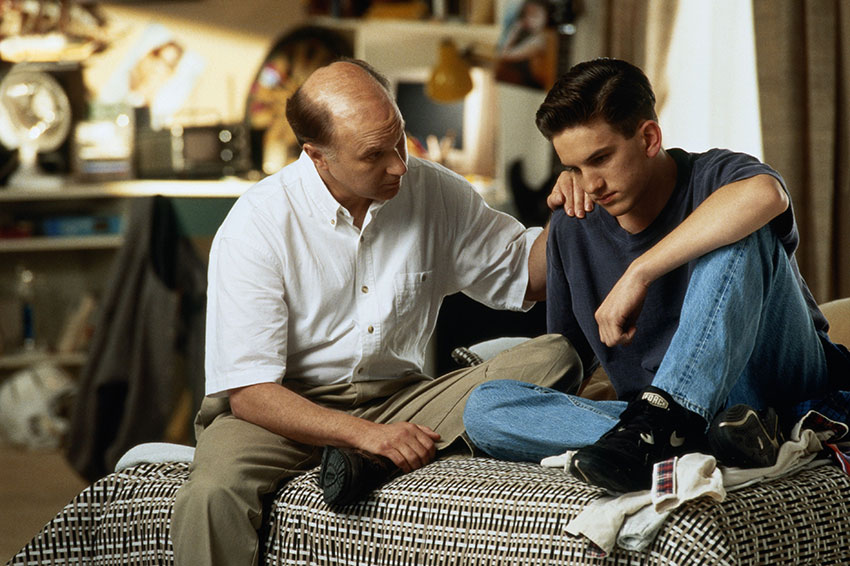 The father, on the other hand, is charged by society with the duty to introduce his son to the world of male hobbies in order to facilitate his subsequent adaptation in the male community. However, there is another, perhaps not so noticeable, but no less important function of the joint hobbies of father and son. In joint hobbies, interpersonal ties between son and father are strengthened. It is known that common activity brings people together. And hobbies, in which both father and son take part, play the same role. The time spent doing your favorite activities creates a favorable atmosphere for establishing contacts, conducive to communication. Thus, joint hobbies strengthen trust and mutual understanding between father and son and create in them a sense of community and ownership of each other's successes.
The father, on the other hand, is charged by society with the duty to introduce his son to the world of male hobbies in order to facilitate his subsequent adaptation in the male community. However, there is another, perhaps not so noticeable, but no less important function of the joint hobbies of father and son. In joint hobbies, interpersonal ties between son and father are strengthened. It is known that common activity brings people together. And hobbies, in which both father and son take part, play the same role. The time spent doing your favorite activities creates a favorable atmosphere for establishing contacts, conducive to communication. Thus, joint hobbies strengthen trust and mutual understanding between father and son and create in them a sense of community and ownership of each other's successes.
You can't punish with regret: strictness and cruelty in father's upbringing
Usually father's punishments are stricter and longer than mother's ones, the father is less likely to make concessions or mitigate decisions on punishment. Incidentally, this shows both the lesser psychological flexibility and the greater conservatism inherent in fathers. However, paradoxically, such methods of influence from the father are perceived by the sons more loyally than if they came from the mother. Perhaps, on some intuitive level, boys understand the need for such punishments. The boy needs paternal severity - this is how he receives the first lessons of interaction with the male community, where laws are often ruled that are not burdened with excessive humanity. Therefore, the severity of paternal punishments is justified. However, here it is important to separate the severity, rigidity of educational influences and cruelty.
Incidentally, this shows both the lesser psychological flexibility and the greater conservatism inherent in fathers. However, paradoxically, such methods of influence from the father are perceived by the sons more loyally than if they came from the mother. Perhaps, on some intuitive level, boys understand the need for such punishments. The boy needs paternal severity - this is how he receives the first lessons of interaction with the male community, where laws are often ruled that are not burdened with excessive humanity. Therefore, the severity of paternal punishments is justified. However, here it is important to separate the severity, rigidity of educational influences and cruelty.
Probably, the main difference between cruelty in punishment and cruelty will be respect for the personality of the son. Punishment associated with the humiliation of a person will never achieve an educational goal, will never lead to a positive result, and cannot be justified in any way. After all, such a punishment is just a mockery. In this sense, even physical punishment, carried out without humiliation, will have a greater positive effect than any bilious mockery of the son.
In this sense, even physical punishment, carried out without humiliation, will have a greater positive effect than any bilious mockery of the son.
Video from Yana Schastie: interview with Professor of Psychology N.I. Kozlov
Topics of conversation: What kind of woman do you need to be in order to successfully marry? How many times do men get married? Why are there so few normal men? Childfree. Parenting. What is love? A story that couldn't be better. Paying for the opportunity to be close to a beautiful woman.
how the relationship with the father affects the life of a man
The relationship between a son and a father is special. Men are by nature more restrained, do not always show true feelings. But one thing is certain: the son incredibly needs his father's love, and the father's vital need is the recognition and respect of his son.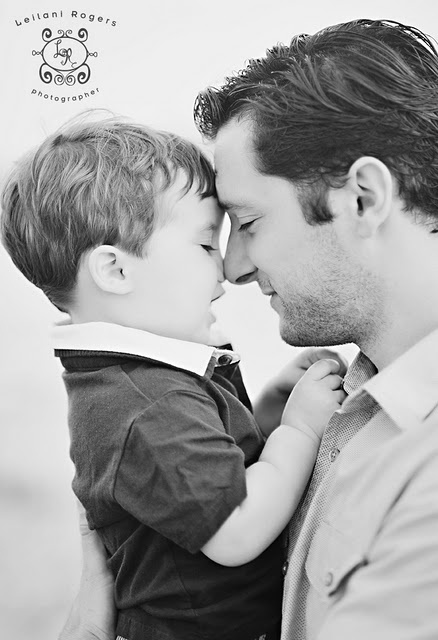
No man can be happy until he understands his father. On the other hand, today it is fashionable to look for the roots of your problems in the mistakes of parenting. How can father and son deal with their relationship?
Father and son problem
Your father may have been an alcoholic. Maybe he beat your mom. Been tough on you. Or maybe he didn’t exist at all and you never saw him.
I will give you statistics in which you will find yourself:
- 30% of men do not communicate with their fathers;
- 30% have difficult and painful relationships with dads;
- 30% communicate, call, meet, talk, but their conversations are reduced to drinking or what kind of heating to choose for the house;
- 10% of men are friends with their fathers, love and respect them.
We are on VKontakte! Subscribe!
I know that many men are anxious because at some point they may show the behavior of their fathers, his thinking or actions. I know it myself. But I also know that if you declared an invisible war on your father, then you have disabled yourself as a man. In the worst sense of the word. At that moment, you stepped on the throat of your manhood. Therefore, you, as a beggar, now have to read books avidly and run around seminars in search of lost strength. Stop. You need to turn back.
I know it myself. But I also know that if you declared an invisible war on your father, then you have disabled yourself as a man. In the worst sense of the word. At that moment, you stepped on the throat of your manhood. Therefore, you, as a beggar, now have to read books avidly and run around seminars in search of lost strength. Stop. You need to turn back.
You don't feel like a man. Precisely because you have problems with your father. Even if he has already died, he still symbolically lives inside you . Where you don't let anyone in. And where you rarely look. Therefore, by the way, I first of all recommend to all men to find a refuge for themselves - a place in which there are no people and no one will distract you from serious questions that you must answer for yourself.
How does a father influence his son?
Do you still think that your father doesn't influence you? Look closer!
Are you the kind of person who distrusts older men, considering them inferior or backward? Do you know why? Because you didn't trust your father.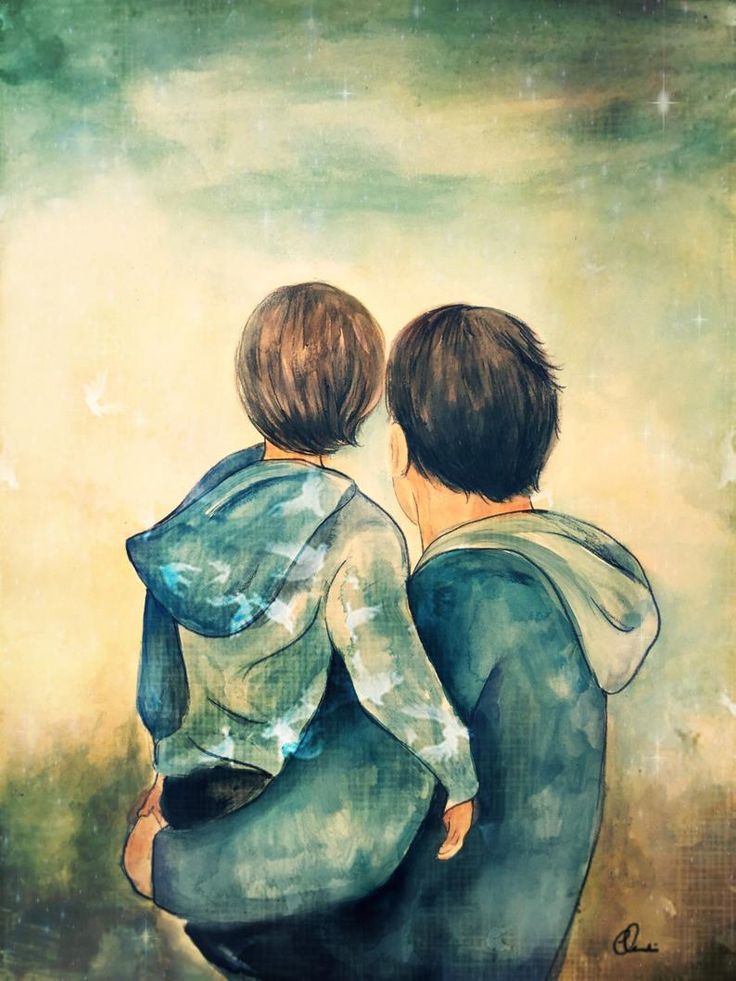
Maybe you don't recognize authorities and demonstratively rebel against them? Are you fighting them? - Is it because your dad did not show you love and was cruel?
Look, maybe it's the other way around? Perhaps you are trying your best to impress others by posting your successful, successful photos, where are you all serious? Tell me why is it important to you? — because you never received the necessary recognition from the main person who should rate you — from your father. Therefore, hundreds of your likes will be quickly forgotten.
You are mistaken if you think that the masculinity that you lack will develop by itself. No, it won't. Masculinity is not a stage in life and not an age. Masculinity is something you can only learn by interacting with other men. But if you have problems with your father, then you will not recognize other men as worthy. What can I say in such a case? - say goodbye to masculinity. If there is no deep connection with men of other generations and strata, you are deprived of the ancient thousand-year-old male culture. Male instincts. And they are not brought up through books or seminars.
Male instincts. And they are not brought up through books or seminars.
Have a series of conversations with your father!
Do you really want to understand yourself and fall in love? Take on courage? Recognize the right to make a mistake? Relieve the weight of many years of inferiority. Feel like a man. Stop pleasing everyone around, in the hope that you will be appreciated and helped? Then you should have a series of conversations with your father. It is necessary to understand his life, the reasons for his behavior and actions. His successes and failures. If this is not done, then you will always build your masculinity on childhood impressions and guesses.
The fact is this: if you don't get to a point in your life where you start to feel love and respect for your father; if you can’t normally accept love and respect for yourself from other men, you will forever remain a boy.
Every father, no matter what he is and no matter what mask he puts on, will wait inside himself for that moment that would help him make sure that his son loves and respects him. Most likely, your father will not be the first to take a step forward. But I repeat once again: he will wait for this all his life. And that's the power you have over your father.
Most likely, your father will not be the first to take a step forward. But I repeat once again: he will wait for this all his life. And that's the power you have over your father.
The power of the Son
It is fashionable to blame your parents for your problems. Yes, we know that parents have absolute power to destroy a child's self-esteem. However, not everyone knows that children have similar power over their parents. Do you want to know what it is? And here is what:
All fathers and mothers expect their children to appreciate them as parents! Was I a good father? Was I a good mom? Until you give your parents a positive assessment, they will interfere in your life, giving advice, instructing or criticizing you. They will go out of their way to earn a high score, even if their actions have the complete opposite effect. That is life.
What does your father need?
In your estimation.
He may act indifferent, avoid talking about your relationship, pretend that everything is already fine - but this is out of fear of hearing a bad assessment of himself as a father.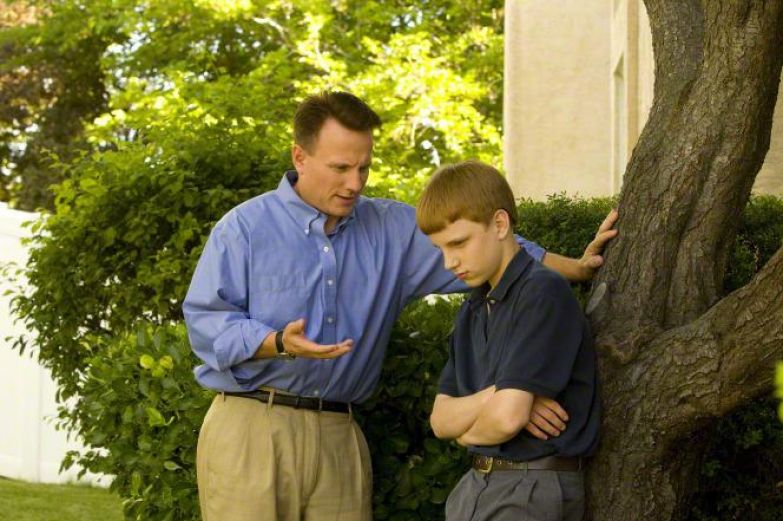 He is afraid of it. He knows it will break him from the inside. That's why he doesn't talk to you about it himself. If your assessment is negative, he will not show that he is hurt and ashamed. He will just die sooner. And that's it.
He is afraid of it. He knows it will break him from the inside. That's why he doesn't talk to you about it himself. If your assessment is negative, he will not show that he is hurt and ashamed. He will just die sooner. And that's it.
How do we evaluate our father? Words of love? - not necessary.
Not words matter to your father. You give him your assessment in a different way. He will read it in the tone of your voice with which you communicate with him on the phone or at meetings: indifferent; seeking to quickly end the conversation; irritable or fearful. He sees your attitude towards him by whether you enjoy spending time in his company. Your touches on his body, arms, shoulders, patting. The way you look into his eyes - with all this you give him your assessment. He is good or bad. Father.
Subscribe to Econet in PINTEREST!
What does the son need?
In love and recognition.
When I visit my friends who have a one-year-old baby, I observe how they react to his behavior. And when the baby blows the harmonica, folds the figures, stomps on the floor or repeats something after the parents, they applaud him, smile or laugh with him, hug him. The father often carries his son in his arms and kisses him. Even if he dropped the phone from the table, no one yells at him. Sons especially need the approval of their fathers, because they are seen less often. While my neighbors across the street are hitting and yelling at their child almost every day. They evaluate his behavior by logic, criticism or some kind of coldness. How different these two children will grow up is already clear.
I myself, having grown up without a father, without his love and approval, often look at myself and my life. And, as a young man, I see that, perhaps, all the successes and achievements I have created are the result of an unsatisfied thirst for recognition: “See, dad? See how I can?
Restore lost communication
Problems are best resolved when fathers are alive.
I know that many men are afraid to reconnect with their father. Few of us expect a good outcome of the discussion. And few people believe that something can change. But I still insist that you do it!
Do not immediately try to find a problem. Do not hurry. Let this be the moment when you are alone. Drink red or a bottle of beer. Women shouldn't be around. And ask him to tell the story of his life. Ask how he remembers his childhood? How was his life at that time? Who was he friends with? Why? Learn about work, hobbies, women of that time, about the decisions he made. Try not to judge him, but approach it with interest, as if he were your old friend.
If you are not simple and open, he will begin to suspect that you want to set a trap for him. In this case, you will not hear a real and sincere story.
Then go back to the moment your mother appeared. Why did he marry her? What did she win him over? Go back to the time you showed up. How was your upbringing? What did your father want to teach you, what did he want to instill? Your father may not even have a clue that he did something right or wrong. Until you tell how you felt then and how it affected your destiny and character.
How was your upbringing? What did your father want to teach you, what did he want to instill? Your father may not even have a clue that he did something right or wrong. Until you tell how you felt then and how it affected your destiny and character.
At some point, he may start swearing or criticizing you. It's OK. You are no longer a little boy. Keep your head clear. And continue the conversation . Over time, you will feel that everything begins to fall into place. When you understand why your father behaved the way he did, you can begin to respect him. And sometimes empathize. Perhaps in your communication you will even hear soft words about forgiveness. But that shouldn't be the point of the conversation. Your job is to understand your father! Having learned and understood it, I promise you that you will automatically begin to understand the blind spots in yourself. And when you begin to respect him, you will be saturated with self-love.
Subscribe! We are in Odnoklassniki!
Your goal is to clear things up with your father.



